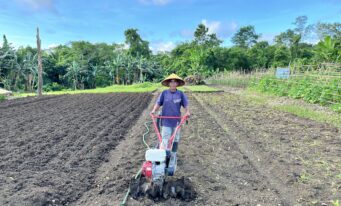

Kupang, January 2015 – In early 2014 Cordaid granted a project agreement and supported Yayasan (foundation) Binatani Sejahtera in delivering and implementing a resilience and livelihood model initiatives in West Timor, Indonesia. The project assists the farmers’ livelihood improvement through vegetable cultivation to increase yield and income while strengthening community capacity and resilience in coping with climatic risks and agro-ecosystems constraints such as erratic and limited rainfall, water shortage, stony soils, and other constraints. The foundation field team delivered technical know-how on good vegetable cultivation to farmers groups in Kotabes and Ponain villages (Kupang district) and in Tubuhue village (Timor Tengah Selatan district).
This is a brief story from Kotabes village exemplifying farmers who are able to plant tomato seedlings on stony soils. Our YBTS field extension officers deliver technical know-how training to farmers groups and they are now able to prepare good seedlings and manage to grow them on the difficult soils. The farmers are happy as irrigation water for their crops is available as they are now having access to irrigation water either via piping with gravitational force from uphill source or pumping from dig-well source. They are planning and now doing a good crops calendar for the year and onwards. As water is now flowing to their farms, they are more confident to get better crops despite decreased rainfall occurrence during the last few months and possibly in coming months. Farmers are also now having a better understanding of the climatic pattern and drought risk/situation they face.

Picture on the up shows the YBTS team with a farmers group in Kotabes field. Not fully seen in the back of the standing people is a water reservoir built to collect pumped water from dig wells – wells that the farmers dig by themselves. The water then is distributed gravitationally via pipe or tape to surrounding farms. Nico Smaut – the farmers group leader of 20 households – said that they are very happy as they build upon better knowledge and improved skills on vegetable farming and have better capacity in overcoming drought risk. They contribute manpower and labors and also local materials needed in making and constructing the irrigation facilities. They expect good harvest in coming months where they can sell tomatoes to nearby markets and also expect that family members can increase consumption of healthy vegetables.
Besides receiving know-how training on good farming practices, the farmers also receive direct information from BMKG Kupang staff especially on a 3-month rainfall forecast during a socialization meeting held in their village. Kupang district government support was also received by the farmers group in forms of tree saplings. The community plants the trees in farm borders, around water sources, backyard and frontyard of their houses.